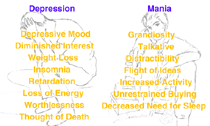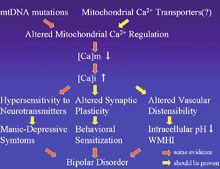 |
Why
do we have to study mental disorders?
Some of you might
think that there is no reason to be concerned about mental disorders. However,
mental disorders are a major source of distress for a large number of patients.
For example, one out of four women experience depression in their lifetime and
more severe mental disorders, such as schizophrenia and bipolar disorder, affect
about 1% of the population. In spite of the fact that mental and neurological
disorders are caused by dysfunctions in the brain, patients and their family members
also suffer from prejudices that exist within society. In order to overcome these
disorders, our laboratory was the second laboratory established in BSI to engage
in studying mental disorders.
The goal of our research is to elucidate the biological basis of bipolar disorder
(manic depressive illness) in order to develop new treatment and diagnostic methods.

magnified
scene by clicking image
Fig.1
|
What
is bipolar disorder?
Bipolar disorder
is one of the two major mental disorders, characterized by recurrent depressive
and manic phases (Fig. 1). It not only threatens the social life of patients because
of their grandiose attitude or unrestrained buying sprees, but may also predispose
them to suicidal acts during their depressive state. There are several drugs available
that may alleviate the symptoms and prevent relapse, but many of patients do not
completely respond to these drugs or stop taking them because of side effects.
Cause
of Bipolar Disorder
Bipolar disorder
is mainly caused by genetic factors. In spite of extensive research, no pathogenetic
gene mutation has been found. Rather, it is now considered that this disease is
caused by multifactorial inheritance, e.g., a combination of many gene polymorphisms
each of which is not pathogenetic, but neutral or even advantageous.
Studies on the mechanisms of action of psychotropic drugs suggest that serotonin,
noradrenalin, and dopamine are related to this disorder. However, no pathogenetic
mutation has yet been found in the pathways of these substances.
Since intracellular calcium response to serotonin or thrombin is accelerated in
blood platelets of patients with bipolar disorder, and lithium acts on the intracellular
signal transduction systems, a functional change in this pathway is considered
to be related to bipolar disorder.

magnified
scene by clicking image
| Fig.2 |
Schema
of mitochondria calcium hypothesis of bipolar disorder. mtDNA: mitochondrial DNA
[Ca]i: Intracellular calcium concentration. [Ca]m: Mitochondrial calcium concentration.
WMHI: white matter hyperintensity lesion detected by magnetic resonance imaging. |
|
Approach
to clarifying causes of bipolar disorder
I was originally
a psychiatrist before I became involved in clinical studies that explore causes
of bipolar disorder. Based on my findings obtained through use of magnetic resonance
spectroscopy, clinical genetics and analysis of mitochondrial DNA, I have arrived
at a working hypothesis, that is, the disruption of the mechanism that regulates
calcium uptake by mitochondria causes bipolar disorder (Fig. 2).
Our team, which was established in September 2000, employs two approaches: one
is a hypothesis-driven approach through which the mitochondrial calcium regulation
hypothesis has been verified to clarify causes of bipolar disease. The other is
to identify the genes related to bipolar disorder using a heuristic approach,
including use of the GeneChip.
Unlike other diseases whose causal substances have been mostly identified, an
interdisciplinary approach from the molecular/cellular level to the individual
level (brain imaging and neurophysiology) is required to determine the causes
of bipolar disease. To realize this goal, a team composed of researchers of various
backgrounds, including molecular biology, electrophysiology and histopathology,
was established to study the causes of bipolar disorder from different viewpoints.
Research
contents
The research contents
are as follows:
Verification of the mitochondrial calcium concentration regulation hypothesis
(1) Study of intracellular calcium metabolism in cultured lymphoblasts from patients
with bipolar disorder.
(2) Imaging of calcium distribution inside the mitochondria and studying mitochondrial
function applying a new fluorescence protein Pericam to hybrid cultured cells
in which mitochondrial DNA of blood platelets from a patient with bipolar disorder
was introduced.
(3) Identification of molecules which are related to calcium regulation in the
mitochondria.
(4) Search for mutations of candidate genes which are considered to be related
to mitochondrial calcium regulation in patients with bipolar disorder.
(5) Visualization of mitochondrial DNA deletions in autopsied brains of patients
with bipolar disorder.
(6) Study of calcium signaling, synaptic plasticity and behavioral sensitization
using model animals in which mutated mitochondrial DNAs are accumulated.
(7) Study of cerebral blood vessel response using near-infrared spectroscopy.
From various viewpoints, the mitochondrial calcium regulation hypothesis is being
studied.
On the other hand, without giving particular reference to this hypothesis, a heuristic
approach is also performed using the following methods in order to directly identify
genes related to bipolar disorder.
(1) Study of changes in gene expression using DNA chips in autopsied brains of
patients with bipolar disorder.
(2) Study of changes in gene expression using cultured lymphoblasts of identical
twins with bipolar disorder affecting only one of the twins.
Conclusion
Clarification
of mental disorders has been dependent on the individual efforts of psychiatrists,
thus much progress has not been realized. Therefore, it is noteworthy that PhD
researchers are seriously pursuing the clarification of mental disorders at a
large-scale brain research center such as the BSI. We will endeavor to clarify
some of the causes of bipolar disorder in the next five years.
|
 |
|
|






